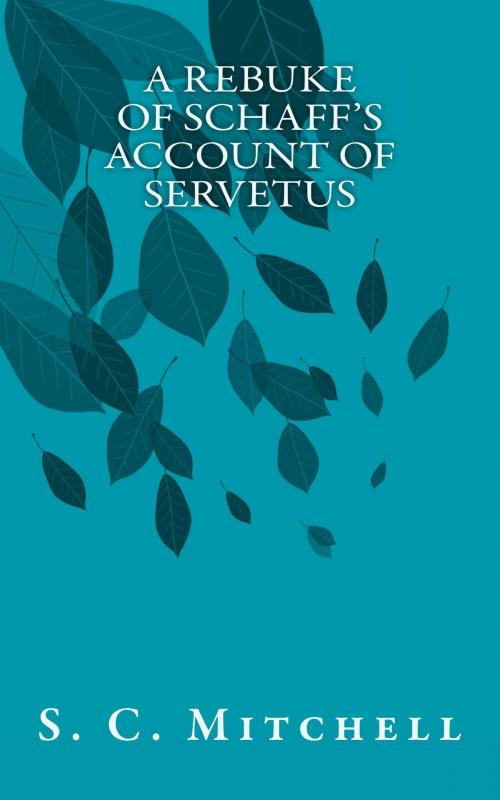A Rebuke of Schaff's Account of Servetus
Nonfiction, Religion & Spirituality, Christianity, Christian Literature| Author: | S. C. Mitchell | ISBN: | 1230001944921 |
| Publisher: | CrossReach Publications | Publication: | September 30, 2017 |
| Imprint: | Language: | English |
| Author: | S. C. Mitchell |
| ISBN: | 1230001944921 |
| Publisher: | CrossReach Publications |
| Publication: | September 30, 2017 |
| Imprint: | |
| Language: | English |
Servetus stands on the border line which separates the intolerance of the Middle Ages from the spirit of religious freedom in modern times. Accordingly the interest centering in Servetus has less to do with his opinions, scientific and theological, though these in many instances anticipated the progress of after centuries, than with his connection with the theory of persecution, which caused his death. “I am more deeply scandalized,” says Gibbon, “at the single execution of Servetus than at the hecatombs which have blazed at the auto-da-fés of Spain and Portugal.”
The present paper grew out of the writer’s feeling that Schaff’s account of Calvin in Vol. VII of his History of the Christian Church is manifestly unfair to Servetus. Even if prior to the reading of that book the facts of Servetus’ life should have been unknown to one, Schaff’s account itself would beget a sense of injustice done to Servetus. This is due to the author’s inability to conceal his grudge against Servetus for having been the innocent victim of Calvin’s intolerance. The reader clearly perceives that Schaff’s facts do not agree with his feeling; and he becomes indignant, not because Calvin put Servetus to death, but because Schaff would like to justify Calvin, if he dared do so. Schaff attempts at least to tone down the malignity of Calvin’s crime by false touches in portraying the life of Servetus. Neither the judgment of the gifted historian nor the plain facts in the case permitted an account that would be openly hostile to Servetus. It is rather in the coloring, in little side thrusts, in insinuations, that this suppressed revengeful feeling gets the better of him.
Servetus stands on the border line which separates the intolerance of the Middle Ages from the spirit of religious freedom in modern times. Accordingly the interest centering in Servetus has less to do with his opinions, scientific and theological, though these in many instances anticipated the progress of after centuries, than with his connection with the theory of persecution, which caused his death. “I am more deeply scandalized,” says Gibbon, “at the single execution of Servetus than at the hecatombs which have blazed at the auto-da-fés of Spain and Portugal.”
The present paper grew out of the writer’s feeling that Schaff’s account of Calvin in Vol. VII of his History of the Christian Church is manifestly unfair to Servetus. Even if prior to the reading of that book the facts of Servetus’ life should have been unknown to one, Schaff’s account itself would beget a sense of injustice done to Servetus. This is due to the author’s inability to conceal his grudge against Servetus for having been the innocent victim of Calvin’s intolerance. The reader clearly perceives that Schaff’s facts do not agree with his feeling; and he becomes indignant, not because Calvin put Servetus to death, but because Schaff would like to justify Calvin, if he dared do so. Schaff attempts at least to tone down the malignity of Calvin’s crime by false touches in portraying the life of Servetus. Neither the judgment of the gifted historian nor the plain facts in the case permitted an account that would be openly hostile to Servetus. It is rather in the coloring, in little side thrusts, in insinuations, that this suppressed revengeful feeling gets the better of him.















